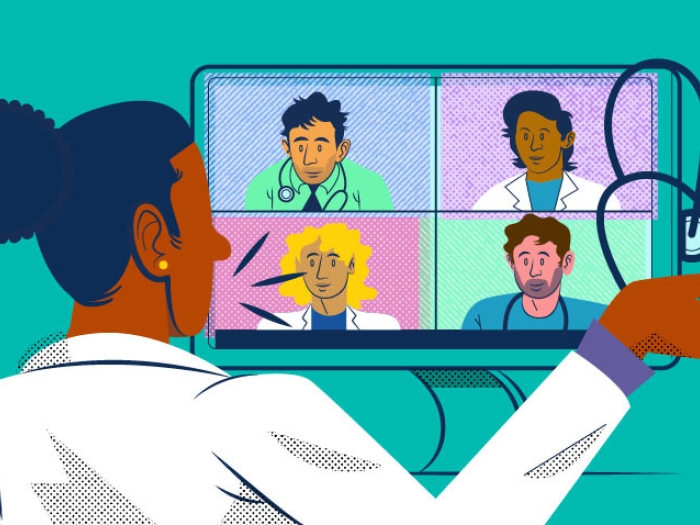A doctor and fourth-year medical student propose improvements to the residency application process during COVID-19 and beyond.
4:50 PM
Author |

Editor's note: Information on the COVID-19 crisis is constantly changing. For the latest numbers and updates, keep checking the CDC's website. For the most up-to-date information from Michigan Medicine, visit the hospital's Coronavirus (COVID-19) webpage.
Interested in a COVID-19 clinical trial? Health research is critical to ending the COVID-19 pandemic. Our researchers are hard at work to find vaccines and other ways to potentially prevent and treat the disease and need your help. Sign up to be considered for a clinical trial at Michigan Medicine.
During this academic year alone, over 40,000 medical students will apply for residency programs throughout the United States. However, due to the ongoing coronavirus pandemic, this process will look very different than in previous years.
"While we are interested in how COVID-19 will ultimately affect the residency selection process this year, there were calls to reform the process even before the pandemic hit," says Maya Hammoud, M.D., a professor of obstetrics and gynecology and learning health sciences at Michigan Medicine. "Many of the longstanding issues are related to the increasing number of programs to which applicants choose to apply. This, of course, places an incredible burden on students, emotionally and financially."
Hammoud adds that testing center closures due to the pandemic may now prevent potential applicants from taking the United States Medical Licensing Examination, or USMLE, which is integral for both students and programs, but especially international medical graduates. IMGs must pass Step 1, Step 2 (Clinical Knowledge) and Step 2 (Clinical Skills) of the USMLE to be certified by the Educational Commission for Foreign Medical Graduates and apply to residency programs in the U.S.
"Additionally, medical schools have now shortened clerkships and have shifted to more virtual care," says Hammoud. "This, coupled with canceling many electives, may significantly reduce student opportunities to obtain important residency requirements, like faculty evaluations and letters of recommendation."
Hammoud adds that these challenges may continue to persist even after interviews are offered, as most programs are shifting to virtual interviews due to travel disruptions and social distancing measures.
MORE FROM THE LAB: Subscribe to our weekly newsletter
With all of these newfound obstacles, Hammoud and Taylor Standiford, a fourth-year medical student at the University of Michigan Medical School, authored a list of proposed solutions to improve the residency application process during the time of COVID-19 and beyond. Their work was recently published in JAMA.
"Through these recommendations, our goal is to create the most equitable and productive process for every student applying into the 2021 residency application cycle," says Standiford. "We are trying to alleviate some of the anxieties surrounding the implications of COVID-19 and even after the pandemic is over."
Here are their guidelines:
Adjust the timeline and modify requirements
"By delaying the release of student applications by several weeks, students will have more time to complete clinical rotations," says Hammoud. "They will also be able to obtain much-needed letters of recommendation and receive scores from standardized tests."
Hammoud adds that if residency programs are flexible with their application requirements, students who couldn't take the USMLE can still effectively apply to the programs of their choice.
Encourage a holistic review process
By embracing a holistic review process instead of relying on traditional screening metrics, Hammoud says the residency application process can be more inclusive.
"A holistic review would consider an individual applicant's many attributes, aptitudes and experiences when thinking about the mission of a particular residency program," says Hammoud. "By doing this, the process may provide information about an applicant's non-cognitive abilities and beyond."
Limit the number of applications
Hammoud notes that a holistic approach to review would be difficult without a decrease in the number of applications received.
"In order to achieve this, academic advisers would have to counsel students to use resources like the National Residency Matching Program's Charting Outcomes in the Match," says Hammoud. "Ultimately, the focus would have to be on the nature of programs to which students apply versus the number of applications."
Expand program information available to applicants
By expanding the information available to students about residency programs, Hammoud notes that students would be able to submit fewer applications. This would be spurred by students only applying to programs that are competitive for their application.
"If programs could commit to presenting transparent screening criteria to potential applicants, for example, many students may decide to apply elsewhere," says Hammoud. "They can also provide unique narratives from faculty and current residents to better inform students about the culture of the program before they submit an application."
Like Podcasts? Add the Michigan Medicine News Break to your Alexa-enabled device or subscribe for updates on iTunes, Google Play and Stitcher.
Improve the quality of information programs receive
Program directors do not currently have standardized information about the clinical performances of students beyond the Medical School Performance Evaluation, or MSPE, which is sometimes limited in communicating things like an applicant's integrity, reliability and professionalism.
By modifying the current system, Hammoud feels that program directors can deprioritize applications from institutions with MSPE letters that aren't formatted to standardized guidelines.
Temporarily make exceptions to the NRMP all-in policy
"To help programs manage the increasingly large number of applications, the NRMP can consider making exceptions for programs to accept some students outside of the match," says Hammoud.
She adds that this adjustment would relieve some stress for students and programs alike, as it will reduce the total number of applications in the pool that program directors have to review.
Cap the number of interviews a student can accept
"If caps are imposed on the number of interviews a student can accept, it could potentially prevent highly qualified candidates from over-interviewing, especially during this virtual interview season," says Hammoud. "This measure would also ensure that there are interview spots available to others."
Implement preference-signaling mechanisms
Hammoud says that many of the inefficiencies within the residency selection process occur because "programs and applicants are unable to discern the true level of interest between each other."
"But by allowing applicants to designate preferred programs, this part of the process could be improved," says Hammoud. "For new Ph.D. graduates in economics, for example, candidates can send an expression of 'special interest' to as many as two potential employers. This helps secure interviews and facilitate matches."
Adopting a similar process for residency applicants can potentially streamline the process.
"By working together, the potential harms of COVID-19 on the residency application process can be mitigated," adds Hammoud. "With thoughtful action, we hope to improve this process for both applicants and residency programs."
Paper cited: "Potential Implications of COVID-19 for the 2020-2021 Residency Application Cycle," JAMA. DOI: 10.1001/jama.2020.8911

Explore a variety of health care news & stories by visiting the Health Lab home page for more articles.

Department of Communication at Michigan Medicine
Want top health & research news weekly? Sign up for Health Lab’s newsletters today!





